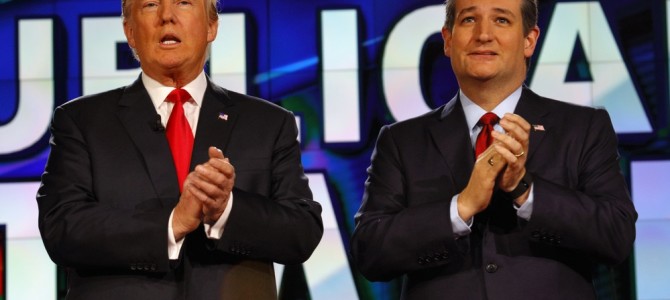
WAUKESHA, Wis. — Part of Donald Trump’s strategy to beat Sen. Ted Cruz in Wisconsin, if you can call it a strategy, has been to trash the state’s top politicians, Gov. Scott Walker and House Speaker Paul Ryan, in his stump speeches. The tactic is either cynical or lazy—or both. Trump says Walker is “doing a terrible job,” and blames him for what he thinks is a high jobless rate and a low labor force participation rate. Never mind that the state’s unemployment rate, at 4.6 percent is below the national average, and labor force participation here has been going up, not down. Either Trump doesn’t know this or doesn’t think the people coming to his rallies will look it up.
As for Ryan, Trump says the House Speaker’s year-end omnibus spending bill was “the worst I’ve ever seen.” But his criticism ends there, with no details about why it’s the worst. Trump surely knows that many conservatives were critical of Ryan’s budget, which makes his budget comments feel rather like his abortion comments over the weekend: he’s just telling GOP voters what he thinks they want to hear. You people don’t like abortion, right? Me neither—women who get them should be punished! You don’t like the Ryan budget? Me neither—worst I’ve ever seen!
This is poor choice of tactic in a state like Wisconsin. Since Walker became governor five years ago, voters here have gone to the polls for 17 state senate and two statewide recall elections, most of which Republicans have won. The recall elections came after an intense political battle over Walker’s budget and labor reforms, which GOP voters supported in 2011 and still think was the right decision to get the state’s finances in order.
Those victories propelled Walker to the national stage, and although his presidential campaign failed to launch (he dropped out last September), the political battles here mobilized and educated Wisconsin voters. As a result, voter turnout tends to be high in the state. In the 2012 presidential elections, the GOP-dominated counties around Milwaukee had a combined 79 percent turnout (one of those, Ozaukee County, saw nearly 84 percent turnout). And statewide turnout by county averaged more than 67 percent, with only one county having less than 55 percent turnout, according to the state’s Government Accountability Board.
Turnout will be a big factor in the GOP primary election, in part because many Republican voters otherwise not inclined to support Cruz say they just don’t want Trump to win, so they’re backing Cruz. But Wisconsinites are also relatively savvy about policy issues, which Cruz, also a policy wonk, has been leveraging to his advantage.
In addition, Walker’s endorsement was a big deal here. Although the national press has been quick to note that Walker’s approval rating statewide fell to 37 percent after he dropped out of the presidential race, his poll numbers were high before that. In the last GOP primary poll before he ended his campaign, Walker was up in Wisconsin by twelve points. And his support remains strong among GOP voters. A Marquette Law School poll released last week made headlines by showing Cruz with a ten-point lead over Trump, 40 to 30, with Kasich at 21. But it also showed Walker with an 80 percent approval rating among Republican voters. Of those, 45 support Cruz—double the combined support for Trump and Kasich, at 27 and 18 percent, respectively.
The poll was conducted March 24-28, before the presidential campaigns swarmed into Wisconsin at the end of last week—and before Walker began making campaign stops with Cruz.
Heading into Tuesday’s vote, Cruz leads Trump by an average of nearly seven points in the most recent polls (although contrasting polls published Monday showed Cruz winning by five points and Trump winning by ten). If Cruz’s numbers hold up, he stands a decent chance of winning most of the state’s 42 delegates.
Wisconsin is a “winner take most” state, which means eighteen of its delegates are awarded to whichever candidate wins a plurality of the statewide vote, and three delegates go to the winner (again by plurality) in each of the state’s eight congressional districts. As of Tuesday morning, FiveThirtyEight was projecting Cruz has a 89 percent chance of winning Wisconsin, a slight drop from the 95 percent rating he had on Sunday.
Whatever the margin, though, it seems clear that Cruz will come out of Wisconsin with a win that will at least energize his campaign ahead of tough primary contests in the northeast later this month, and at most deny Trump the ability to win enough delegates to secure the GOP nomination at the convention in July.
And that means battled-hardened Wisconsin voters might well be deciding the future of the Republican Party.









